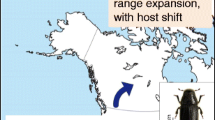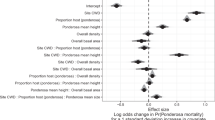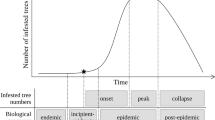Abstract
Although spatial variation in climate can directly affect the survival and reproduction of forest insects and the tree species compositions of forests, little is known about the indirect effects of climate on outbreaks of forest insects through its effects on forest composition. In this study, we use structural equation modeling to examine the direct and indirect effects of climate, water capacity of the soil, host tree density, and non-host density on the spatial extent of Lymantria dispar outbreaks in the Eastern USA over a period of 44 years (1975–2018). Host species were subdivided into four taxonomic and ecologically distinct groups: red oaks (Lobatae), white oaks (Lepidobalanus), other preferred hosts, and intermediate (less preferred) hosts. We found that mean annual temperature had stronger effects than mean annual precipitation on the spatial extent of outbreaks, and that indirect effects of temperature (via its effects on oak density) on defoliation were stronger than direct effects. The density of non-host trees increased with increasing precipitation and, consistent with the ‘associational resistance hypothesis’, defoliation decreased with increasing density of non-host trees. This study offers quantitative evidence that geographic variation in climate can indirectly affect outbreaks of a forest insect through its effects on tree species composition.




Similar content being viewed by others
Availability of data and materials
Upon acceptance, the datasets will be deposited in Dryad.
References
Andresen JA, McCullough DG, Potter BE et al (2001) Effects of winter temperatures on gypsy moth egg masses in the Great Lakes region of the United States. Agric for Meteorol 110:85–100. https://doi.org/10.1016/S0168-1923(01)00282-9
Atsatt PR, O’dowd DJ (1976) Plant defense guilds. Science 193:24–29. https://doi.org/10.1126/science.193.4247.24
Battisti A, Larsson S (2015) Climate change and insect pest distribution range. In: Björkman C, Niemelä P (eds) Climate change and insect pests. CABI, Boston, MA, pp 1–15
Bechtold WA, Patterson PL (eds) (2005) The enhanced forest inventory and analysis program—national sampling design and estimation procedures. https://doi.org/10.2737/SRS-GTR-80
Berryman AA (1996) What causes population cycles of forest Lepidoptera? Trends Ecol Evol (amst) 11:28–32. https://doi.org/10.1016/0169-5347(96)81066-4
Bertrand R, Lenoir J, Piedallu C et al (2011) Changes in plant community composition lag behind climate warming in lowland forests. Nature 479:517–520. https://doi.org/10.1038/nature10548
Bivand R, Piras G (2015) Comparing implementations of estimation methods for spatial econometrics. J Stat Softw 63:1–36. https://doi.org/10.18637/jss.v063.i18
Bivand RS, Wong DWS (2018) Comparing implementations of global and local indicators of spatial association. TEST 27:716–748. https://doi.org/10.1007/s11749-018-0599-x
Campbell RW (1974) The gypsy moth and its natural enemies. USDA Forest Service, Washington, DC, USA
Candau J-N, Fleming RA (2005) Landscape-scale spatial distribution of spruce budworm defoliation in relation to bioclimatic conditions. Can J for Res 35:2218–2232. https://doi.org/10.1139/x05-078
Candau J-N, Fleming RA (2011) Forecasting the response of spruce budworm defoliation to climate change in Ontario. Can J for Res 41:1948–1960. https://doi.org/10.1139/x11-134
Clotfelter ED, Pedersen AB, Cranford JA et al (2007) Acorn mast drives long-term dynamics of rodent and songbird populations. Oecologia 154:493–503. https://doi.org/10.1007/s00442-007-0859-z
Damgaard C (2019) A Critique of the space-for-time substitution practice in community ecology. Trends Ecol Evol (amst) 34:416–421. https://doi.org/10.1016/j.tree.2019.01.013
Davidson CB, Johnson JE, Gottschalk KW, Amateis RL (2001) Prediction of stand susceptibility and gypsy moth defoliation in Coastal Plain mixed pine–hardwoods. Can J for Res 31:1914–1921. https://doi.org/10.1139/x01-124
Dey DC (2014) Sustaining oak forests in eastern North America: regeneration and recruitment, the pillars of sustainability. For Sci 60:926–942. https://doi.org/10.5849/forsci.13-114
Elias SP, Witham JW, Hunter ML (2004) Peromyscus leucopus abundance and acorn mast: population fluctuation patterns over 20 years. J Mammal 85:743–747. https://doi.org/10.1644/BER-025
Elkinton J, Liebhold AM (1990) Population dynamics of gypsy moth in North America. Annu Rev Entomol 35:571–596. https://doi.org/10.1146/annurev.ento.35.1.571
Elkinton JS, Healy WM, Buonaccorsi JP et al (1996) Interactions among gypsy moths, white-footed mice, and acorns. Ecology 77:2332–2342. https://doi.org/10.2307/2265735
Elton CA (1927) Animal ecology. Sidgwick and Jackson, London
Esper J, Büntgen U, Frank DC et al (2007) 1200 years of regular outbreaks in alpine insects. Proc Biol Sci 274:671–679. https://doi.org/10.1098/rspb.2006.0191
Fox JF (1982) Adaptation of gray squirrel behavior to autumn germination by white oak acorns. Evolution 36:800. https://doi.org/10.2307/2407893
Gray DR (2004) The gypsy moth life stage model: landscape-wide estimates of gypsy moth establishment using a multi-generational phenology model. Ecol Model 176:155–171. https://doi.org/10.1016/j.ecolmodel.2003.11.010
Gray DR (2008) The relationship between climate and outbreak characteristics of the spruce budworm in eastern Canada. Clim Change 87:361–383
Guo Q, Fei S, Potter KM et al (2019) Tree diversity regulates forest pest invasion. Proc Natl Acad Sci USA 116:7382–7386. https://doi.org/10.1073/pnas.1821039116
Hadj-Chikh LZ, Steele MA, Smallwood PD (1996) Caching decisions by grey squirrels: a test of the handling time and perishability hypotheses. Anim Behav 52:941–948. https://doi.org/10.1006/anbe.1996.0242
Hartl-Meier C, Esper J, Liebhold A et al (2017) Effects of host abundance on larch budmoth outbreaks in the European Alps. Agric for Entomol 19:376–387. https://doi.org/10.1111/afe.12216
Herrick OW, Gansner DA, Gansner DA (1986) Rating forest stands for gypsy moth defoliation. Research Paper NE-583. US Department of Agriculture, Forest Service, Northeastern Forest Experiment Station, Broomall, PA, p 4
Horsley SB, Stout SL, deCalesta DS (2003) White-tailed deer impact on the vegetation dynamics of a northern hardwood forest. Ecol Appl 13:98–118. https://doi.org/10.1890/1051-0761(2003)013[0098:WTDIOT]2.0.CO;2
Iverson LR, Prasad AM (1998) Predicting abundance of 80 tree species following climate change in the eastern united states. Ecol Monogr 68:465–485. https://doi.org/10.1890/0012-9615(1998)068[0465:PAOTSF]2.0.CO;2
Jactel H, Brockerhoff EG (2007) Tree diversity reduces herbivory by forest insects. Ecol Lett 10:835–848. https://doi.org/10.1111/j.1461-0248.2007.01073.x
Jactel H, Moreira X, Castagneyrol B (2021) Tree diversity and forest resistance to insect pests: patterns, mechanisms, and prospects. Annu Rev Entomol 66:277–296. https://doi.org/10.1146/annurev-ento-041720-075234
Jepsen JU, Hagen SB, Ims RA, Yoccoz NG (2008) Climate change and outbreaks of the geometrids Operophtera brumata and Epirrita autumnata in subarctic birch forest: evidence of a recent outbreak range expansion. J Anim Ecol 77:257–264. https://doi.org/10.1111/j.1365-2656.2007.01339.x
Johnson DM, Büntgen U, Frank DC et al (2010) Climatic warming disrupts recurrent Alpine insect outbreaks. Proc Natl Acad Sci USA 107:20576–20581. https://doi.org/10.1073/pnas.1010270107
Jones CG, Ostfeld RS, Richard MP et al (1998) Chain reactions linking acorns to gypsy moth outbreaks and Lyme disease risk. Science 279:1023–1026. https://doi.org/10.1126/science.279.5353.1023
Koricheva J, Vehviläinen H, Riihimäki J et al (2006) Diversification of tree stands as a means to manage pests and diseases in boreal forests: myth or reality? Can J for Res 36:324–336. https://doi.org/10.1139/x05-172
Lefcheck JS (2016) Piecewisesem: piecewise structural equation modelling in R for ecology, evolution, and systematics. Methods Ecol Evol 7:573–579. https://doi.org/10.1111/2041-210X.12512
Liebhold AM, Tobin PC (2006) Growth of newly established alien populations: comparison of North American gypsy moth colonies with invasion theory. Popul Ecol 48:253–262. https://doi.org/10.1007/s10144-006-0014-4
Liebhold AM, Elmes GA, Halverson JA, Quimby J (1994) Landscape characterization of forest susceptibility to gypsy moth defoliation. For Sci 40:18–29
Liebhold AM, Gottschalk KW, Muzika RM et al (1995) Suitability of North American tree species: a summary of field and laboratory tests. USDA, PA
Liebhold AM, Gottschalk KW, Luzader ER et al (1997) Gypsy moth in the United States, an atlas. USDA Forest Service Radnor, PA
Lovett GM, Christenson LM, Groffman PM et al (2002) Insect defoliation and nitrogen cycling in forests. Bioscience 52:335. https://doi.org/10.1641/0006-3568(2002)052[0335:IDANCI]2.0.CO;2
Martinat PJ (1987) The role of climatic variation and weather in forest insect outbreaks. In: Barbosa P, Schultz J (eds) Insect outbreaks. Academic Press, New York, pp 241–268
Mason CJ, McManus ML (1981) Larval dispersal of the gypsy moth. The gypsy moth: research toward integrated pest management. U.S. Department of Agriculture, Washington, DC, pp 161–202
Morin RS, Liebhold AM (2016) Invasive forest defoliator contributes to the impending downward trend of oak dominance in eastern North America. Forestry 89:284–289. https://doi.org/10.1093/forestry/cpv053
Morin X, Augspurger C, Chuine I (2007) Process-based modeling of species’ distributions: what limits temperate tree species’ range boundaries? Ecology 88:2280–2291. https://doi.org/10.1890/06-1591.1
Nowacki GJ, Abrams MD (2008) The demise of fire and “mesophication” of forests in the eastern united states. Bioscience 58:123–138. https://doi.org/10.1641/B580207
Pimentel D (1961) Species diversity and insect population outbreaks. Ann Entomol Soc Am 54:76–86. https://doi.org/10.1093/aesa/54.1.76
R Core Team (2020) R: a language and environment for statistical computing. R Foundation for Statistical Computing, Vienna, Austria. https://www.R-project.org/
Reilly JR, Hajek AE, Liebhold AM, Plymale R (2014) Impact of Entomophaga maimaiga (Entomophthorales: Entomophthoraceae) on outbreak gypsy moth populations (Lepidoptera: Erebidae): the role of weather. Environ Entomol 43:632–641. https://doi.org/10.1603/EN13194
Robert L-E, Sturtevant BR, Kneeshaw D (2020) Forest landscape structure influences the cyclic-eruptive spatial dynamics of forest test caterpillar outbreaks. Ecosphere 11:e03096. https://doi.org/10.1002/ecs2.3096
Roland J, Mackey BG, Cooke B (1998) Effects of climate and forest structure on duration of forest tent caterpillar outbreaks across Central Ontario, Canada. Can Entomol 130:703–714. https://doi.org/10.4039/Ent130703-5
Schneider RR, Devito K, Kettridge N, Bayne E (2015) Moving beyond bioclimatic envelope models: integrating upland forest and peatland processes to predict ecosystem transitions under climate change in the western Canadian boreal plain. Ecohydrology 9:899–908. https://doi.org/10.1002/eco.1707
Seidl R, Schelhaas M-J, Lexer MJ (2011) Unraveling the drivers of intensifying forest disturbance regimes in Europe. Glob Change Biol 17:2842–2852. https://doi.org/10.1111/j.1365-2486.2011.02452.x
Shimada T, Saitoh T (2006) Re-evaluation of the relationship between rodent populations and acorn masting: a review from the aspect of nutrients and defensive chemicals in acorns. Popul Ecol 48:341–352. https://doi.org/10.1007/s10144-006-0012-6
Shipley B (2009) Confirmatory path analysis in a generalized multilevel context. Ecology 90:363–368. https://doi.org/10.1890/08-1034.1
Shipley B, Douma JC (2020) Generalized AIC and chi-squared statistics for path models consistent with directed acyclic graphs. Ecology 101:e02960. https://doi.org/10.1002/ecy.2960
Sholes ODV (2008) Effects of associational resistance and host density on woodland insect herbivores. J Anim Ecol 77:16–23. https://doi.org/10.1111/j.1365-2656.2007.01317.x
Smith HR (1985) Wildlife and the gypsy moth. Wildl Soc Bull 13:166–174
Steele MA, Turner G, Smallwood PD et al (2001) Cache management by small mammals: experimental evidence for the significance of acorn-embryo excision. J Mammal 82:35–42. https://doi.org/10.1644/1545-1542(2001)082%3c0035:CMBSME%3e2.0.CO;2
Streifel MA, Tobin PC, Kees AM, Aukema BH (2019) Range expansion of Lymantria dispar dispar (L.) (Lepidoptera: Erebidae) along its north-western margin in North America despite low predicted climatic suitability. J Biogeogr 46:58–69. https://doi.org/10.1111/jbi.13474
Thompson LM, Faske TM, Banahene N et al (2017) Variation in growth and developmental responses to supraoptimal temperatures near latitudinal range limits of gypsy moth Lymantria dispar (L.), an expanding invasive species. Physiol Entomol 42:181–190. https://doi.org/10.1111/phen.12190
Thompson LM, Powers SD, Appolon A et al (2020) Climate-related geographical variation in performance traits across the invasion front of a widespread non-native insect. J Biogeogr. https://doi.org/10.1111/jbi.14005
USDA, NRCS (2019) National soil survey handbook. https://www.nrcs.usda.gov/wps/portal/nrcs/detail/soils/ref/?cid=nrcs142p2_054242. Accessed 5 Nov 2020
Williams DW, Liebhold AM (1995) Herbivorous insects and global change: potential changes in the spatial distribution of forest defoliator outbreaks. J Biogeogr 22:665. https://doi.org/10.2307/2845968
Wolff JO (1996a) Coexistence of white-footed mice and deer mice may be mediated by fluctuating environmental conditions. Oecologia 108:529–533. https://doi.org/10.1007/BF00333730
Wolff JO (1996b) Population fluctuations of mast-eating rodents are correlated with production of acorns. J Mammal 77:850. https://doi.org/10.2307/1382690
Acknowledgements
We thank Eugene Luzader for assistance with data. AML received support from grant EVA4.0, No. CZ.02.1.01/0.0/0.0/16_019/0000803 financed by OP RDE.
Funding
AML received support from grant EVA4.0, No. CZ.02.1.01/0.0/0.0/16_019/0000803 financed by OP RDE.
Author information
Authors and Affiliations
Contributions
KH and AL conceived the study, KH, AL, JL and RM developed the methodology, JL and KJ performed the statistical analyses, and all authors wrote the manuscript.
Corresponding author
Ethics declarations
Conflict of interest
Not applicable.
Ethics approval
Not applicable.
Consent to participate
Not applicable.
Consent for publication
Not applicable.
Additional information
Communicated by Martin Gossner.
Supplementary Information
Below is the link to the electronic supplementary material.
Rights and permissions
About this article
Cite this article
Haynes, K.J., Liebhold, A.M., Lefcheck, J.S. et al. Climate affects the outbreaks of a forest defoliator indirectly through its tree hosts. Oecologia 198, 407–418 (2022). https://doi.org/10.1007/s00442-022-05123-w
Received:
Accepted:
Published:
Issue Date:
DOI: https://doi.org/10.1007/s00442-022-05123-w




